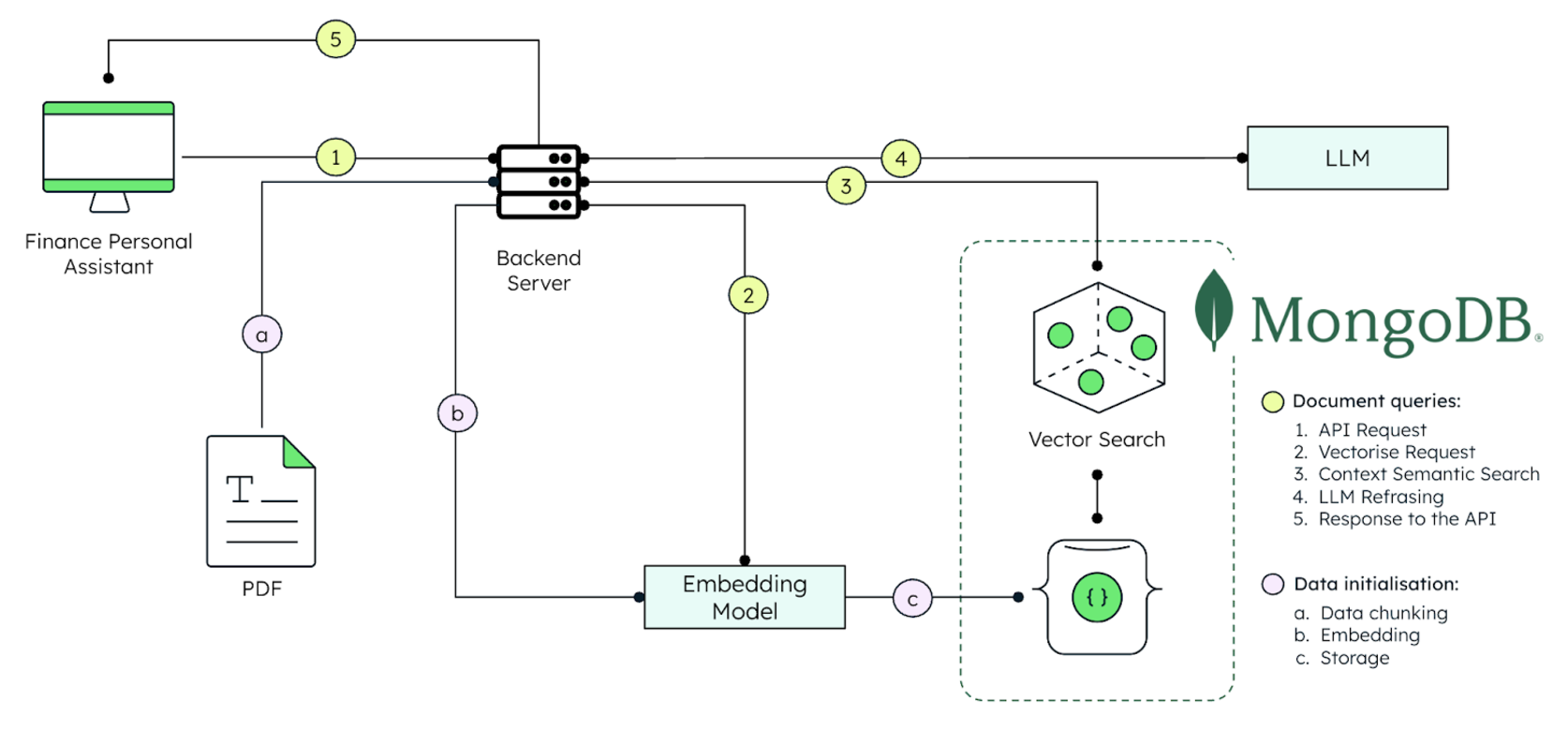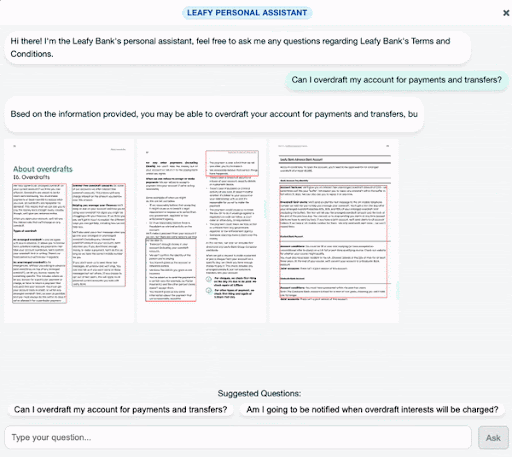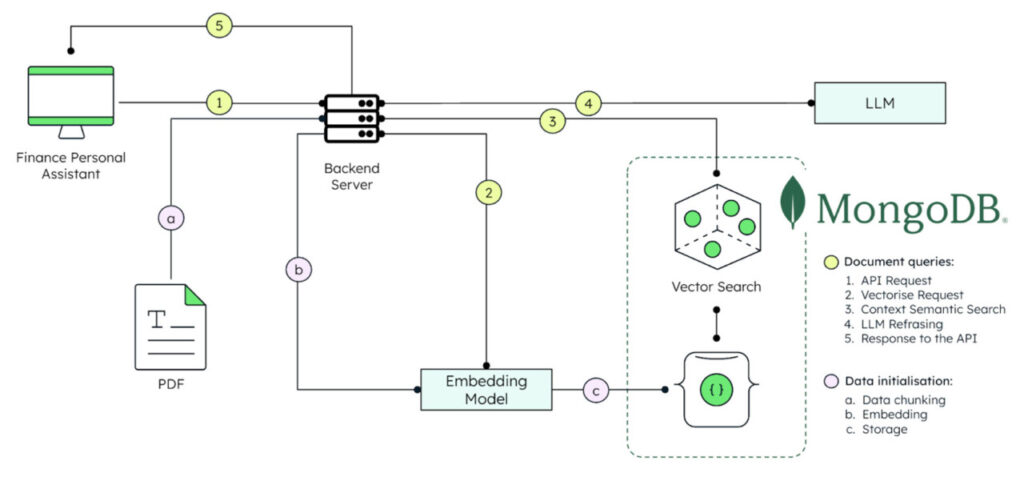Interactive banking represents a new era in financial services where customers engage with digital platforms that anticipate, understand, and meet their needs in real-time. This approach encompasses AI-driven technologies such as chatbots, virtual assistants, and predictive analytics that allow banks to enhance digital self-service while delivering personalized, context-aware interactions.
According to Accenture’s 2023 consumer banking study, 44% of consumers aged 18-44 reported difficulty accessing human support when needed, underscoring the demand for more responsive digital solutions that help bridge this gap between customers and financial services. Generative AI technologies like chatbots and virtual assistants can fill this need by instantly addressing inquiries, providing tailored financial advice, and anticipating future needs. This shift has tremendous growth potential; the global chatbot market is expected to grow at a CAGR of 23.3% from 2023 to 2030, with the financial sector experiencing the fastest growth rate of 24.0%.
This shift is more than just a convenience; it aims to create a smarter, more engaging, and intuitive banking journey for every user.
Simplifying self-service banking with AI
Navigating daily banking activities like transfers, payments, and withdrawals can often raise immediate questions for customers: “Can I overdraft my account?†“What will the penalties be?†or “How can I avoid these fees?†While the answers usually lie within the bank’s terms and conditions, these documents are often dense, complex, and overwhelming for the average user. At the same time, customers value their independence and want to handle their banking needs through self-service channels, but wading through extensive fine print isn’t what they signed up for.
By integrating AI-driven advisors into the digital banking experience, banks can provide a seamless, in-app solution that delivers instant, relevant answers. This removes the need for customers to leave the app to sift through pages of bank documentation in search of answers, or worse, endure the inconvenience of calling customer service. The result is a smoother and user-friendly interaction, where customers feel supported in their self-service journey, free from the frustration of navigating traditional, cumbersome information sources. The entire experience remains within the application, enhancing convenience and efficiency.
Solution overview
This AI-driven solution enhances the self-service experience in digital banking by applying Retrieval-Augmented Generation (RAG) principles, which combine the power of generative AI with reliable information retrieval, ensuring that the chatbot provides accurate, contextually relevant responses.
The approach begins by processing dense, text-heavy documents, like terms and conditions, often the source of customer inquiries. These documents are divided into smaller, manageable chunks vectorized to create searchable data representations. Storing these vectorized chunks in MongoDB Atlas allows for efficient querying using MongoDB Atlas Vector Search, making it possible to instantly retrieve relevant information based on the customer’s question.

When a customer inputs a question in the banking app, the system quickly identifies and retrieves the most relevant chunks using semantic search. The AI then uses this information to generate clear, contextually relevant answers within the app, enabling a smooth, frustration-free experience without requiring customers to sift through dense documents or contact support.

How MongoDB supports AI-driven banking solutions
MongoDB offers unique capabilities that empower financial institutions to build and scale AI-driven applications.
Unified data model for flexibility: MongoDB’s flexible document model unifies structured and unstructured data, creating a consistent dataset that enhances the AI’s ability to understand and respond to complex queries. This model enables financial institutions to store and manage customer data, transaction history, and document content within a single system, streamlining interactions and making AI responses more contextually relevant.
Vector search for enhanced querying: MongoDB Atlas Vector Search makes it easy to perform semantic searches on vectorized document chunks, quickly retrieving the most relevant information to answer user questions. This capability allows the AI to find precise answers within dense documents, enhancing the self-service experience for customers.
Scalable integration with AI models: MongoDB is designed to work seamlessly with leading AI frameworks, allowing banks to integrate and scale AI applications quickly and efficiently. By aligning MongoDB Atlas with cloud-based LLM providers, banks can use the best tools available to interpret and respond to customer queries accurately, meeting demand with responsive, real-time answers.
High performance and cost efficiency: MongoDB’s multi-cloud, developer-friendly platform allows financial institutions to innovate without costly infrastructure changes. It’s built to scale as data and AI needs to grow, ensuring banks can continually improve the customer experience with minimal disruptions. MongoDB’s built-in scalability allows banks to expand their AI capabilities effortlessly, offering a future-proof foundation for digital banking.
Building future-proof applications
Implementing generative AI presents several advantages, not only for end-users of the interactive banking applications but also for financial institutions: Enhanced user experience encourages customer satisfaction, ensures retention, boosts reputation, and reduces customer turnover while unlocking new opportunities for cross-selling and up-selling to increase revenue, drive growth and elevate customer value.
Moreover, adopting AI-driven initiatives prepares the groundwork for businesses to develop innovative, creative, and future-proof applications to address customer needs and upgrade business applications with features that are shaping the industry and will continue to do so, here are some examples:
Summarize and categorize transactional information by powering applications with MongoDB’s Real-Time Analytics.
Understand and find trends based on customer behavior that could positively impact and leverage fraud prevention, anti-money laundering (AML), and credit card application (just to mention a few).
Offering investing, budgeting, and loan assessments through AI-powered conversational banking experience.
In today’s data-driven world, companies face increasing pressure to stay ahead of rapid technological advancements and ever-evolving customer demands. Now more than ever, businesses must deliver intuitive, robust, and high-performing services through their applications to remain competitive and meet user expectations.
Luckily, MongoDB provides businesses with comprehensive reference architectures for building generative AI applications, an end-to-end technology stack that includes integrations with leading technology providers, professional services, and a coordinated support system through the MongoDB AI Applications Program (MAAP). By building AI-enriched applications with the leading multi-cloud developer data platform, companies can leverage low-cost, efficient solutions through MongoDB’s flexible and scalable document model which empowers businesses to unify real-time, operational, unstructured, and AI-related data, extending and customizing their applications to seize upcoming technological opportunities.
Check out these additional resources to get started on your AI journey with MongoDB:
How Leading Industries are Transforming with AI and MongoDB Atlas – E-book
Our Solutions Library is where you can learn about different use cases for gen AI and other interesting topics that are applied to financial services and many other industries.
Source: Read More

